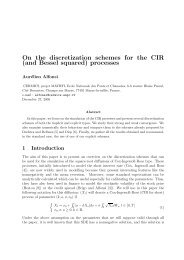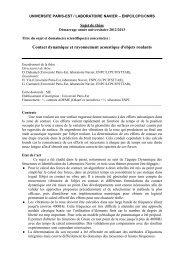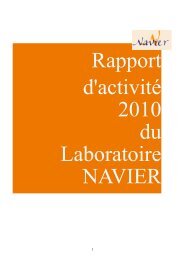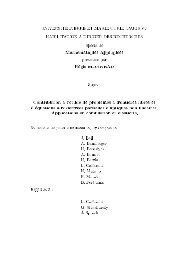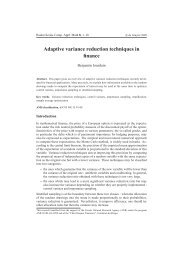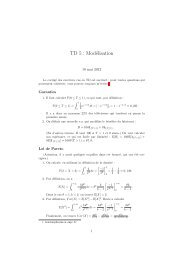The geography of inequalities in Europe Philippe Martin ... - ENPC
The geography of inequalities in Europe Philippe Martin ... - ENPC
The geography of inequalities in Europe Philippe Martin ... - ENPC
Create successful ePaper yourself
Turn your PDF publications into a flip-book with our unique Google optimized e-Paper software.
then be argued that national redistribution tools are sufficient for cohesion. To test this, we addthe log <strong>of</strong> per capita expenditure on social transfers (SOCIAL) which we <strong>in</strong>terpret as measur<strong>in</strong>gthe preference <strong>of</strong> the country for redistribution. Note that these are measures <strong>of</strong> nationalredistribution and not <strong>of</strong> regional policies. <strong>The</strong> <strong>in</strong>terest<strong>in</strong>g result is that <strong>in</strong>troduc<strong>in</strong>g this crudemeasure <strong>of</strong> the national redistributive policy does not reduce the coefficient on spatial <strong>in</strong>come<strong>in</strong>equality (SPATIAL). If anyth<strong>in</strong>g, it <strong>in</strong>creases the correlation between social and spatial<strong><strong>in</strong>equalities</strong>.In columns 3 and 4, we redo the exercise but us<strong>in</strong>g a different measure <strong>of</strong> spatial<strong>in</strong>equality. Spatial <strong>in</strong>equality is now <strong>in</strong> terms <strong>of</strong> unemployment us<strong>in</strong>g the Commission measure“Cohesion” which measures regional dispersion <strong>of</strong> unemployment rates for each country. In thiscase, this measure <strong>of</strong> spatial <strong>in</strong>equality is not significantly correlated to <strong>in</strong>come <strong>in</strong>equality. When,<strong>in</strong> column 5, we put both measures <strong>of</strong> spatial <strong>in</strong>equality <strong>in</strong> the regression only the spatial<strong>in</strong>equality <strong>in</strong> <strong>in</strong>comes is significantly correlated with <strong>in</strong>dividual <strong><strong>in</strong>equalities</strong>. <strong>The</strong> correlation isalso quantitatively quite large. Given that the variables are <strong>in</strong> logs, the estimated coefficients canbe <strong>in</strong>terpreted as elasticities. Hence, a 10% <strong>in</strong>crease <strong>in</strong> spatial <strong><strong>in</strong>equalities</strong> <strong>of</strong> <strong>in</strong>come is correlatedwith a 9.7% <strong>in</strong>crease <strong>in</strong> <strong>in</strong>dividual <strong>in</strong>comes, even after controll<strong>in</strong>g for regional <strong><strong>in</strong>equalities</strong> <strong>in</strong>unemployment, for <strong>in</strong>come per capita, social transfers, year and country fixed effects.This exercise should obviously be <strong>in</strong>terpreted with caution as many other determ<strong>in</strong>antscan affect <strong>in</strong>dividual <strong>in</strong>come <strong><strong>in</strong>equalities</strong>. <strong>The</strong> sense <strong>of</strong> causality is also not obvious. Clearly,spatial <strong><strong>in</strong>equalities</strong> could affect <strong>in</strong>dividual <strong><strong>in</strong>equalities</strong> but <strong>in</strong>dividual <strong><strong>in</strong>equalities</strong> could also leadto spatial <strong><strong>in</strong>equalities</strong> if agents (rich and poor) agglomerate <strong>in</strong> different regions. It suggestshowever that the l<strong>in</strong>k between regional and social <strong><strong>in</strong>equalities</strong> seems <strong>in</strong>deed strong even whenwe control for year and country specific effects and that national redistribution policies seem notfully able to elim<strong>in</strong>ate the impact <strong>of</strong> regional <strong>in</strong>come <strong><strong>in</strong>equalities</strong> on social <strong><strong>in</strong>equalities</strong>.





